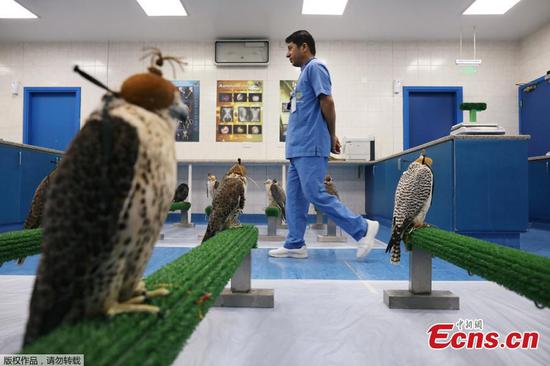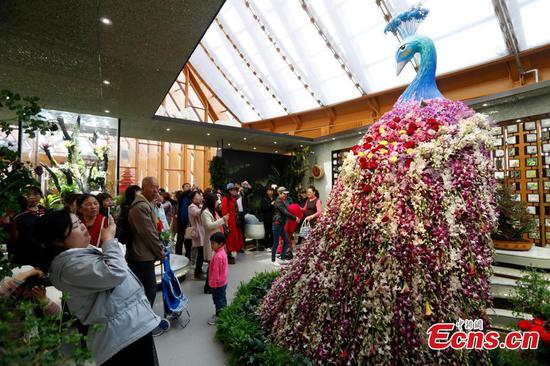
Job seekers pose queries during a job fair in Kunming, capital of Yunnan province. (Photo by Liu Ranyang/China News Service)
Survey shows employees on lookout for new challenges, better prospects
Chinese white-collar workers showed a stronger job-hopping propensity this spring than the same period last year. Culture, media, internet and finance industries showed the highest mobility, a report said.
About 74 percent of 36,448 white-collar workers interviewed said they were seeking, or already landed, a new job. This is 4.43 percentage points higher than last spring, according to a recent report from Zhaopin, a Chinese online recruitment services provider.
Salary, future development of the company and job promotion opportunity were the top three reasons for job-hopping, it said.
Professional development and work-life balance are also important factors for employees born in the 1980s or 1990s, since they did not experience the difficult times like the previous generations. The new generation tends to seek realization of individual value, instead of merely economic return, according to Zhaopin.
One such new-gen professional is Karen Lau, 35, a marketing communications professional in Hong Kong. In February, Lau resigned from the company where she had been working for six years.
"I felt that it's time to get a fresh perspective (on life and career) and upgrade my skills to excel in a different environment," she said.
Chen, a 28-year-old public relations practitioner in Beijing, left the company in January before receiving the year-end bonus. He did not receive a higher compensation package in his new job either.
"Since professionals like me are going to spend many years working, the current salary is not as important as what you can learn and how you can improve yourself in the job," he said.
The culture and media industries where Lau and Chen worked saw the highest number of job-hoppers in China, according to Zhaopin. The main reasons are high work-related pressures, fierce competition among companies and more job-hopping opportunities, it said.
Industries with the highest worker mobility also include the internet and finance industries, which were said to have seen job cuts, with some allegedly forcing some of their employees to move on.
Didi Chuxing, China's major ride-booking company, said in February that it plans to cut 2,000 jobs, or 15 percent of its workforce, to focus on core services and save on internal costs.
E-commerce giant JD was planning to lay off 10 percent of its executives above the vice-president level in February this year. Other tech companies like Meituan Dianping and LeEco have confirmed, or are rumored to have started, layoffs.
Charlie Liu, industrial practice leader and partner of global executive search firm Heidrick &Struggles in China, said the downturn pressures of the economy have also made companies take a more cautious approach to human resources.
"When the company is struggling between life and death, there is no space for idlers," he said.
Considering the growing competition among corporates, and the race for the best talent, Liu said more frequent job-hopping will occur in the following five to six years, as more companies are being eliminated by market forces.
"Companies are facing challenges because most of them lack the core competitiveness. It's a good thing for the market to decide who can survive and who should be kicked out," he said.
Carrie Zang, senior associate of recruiting and resourcing of global consultancy firm Prophet, said that due to shrinking profits, companies are less willing to give a raise or promotions to employees, which will likely create dissatisfaction, resentment, frustration and a perception of stagnation among employees.
She said emerging industries, such as blockchain, artificial intelligence and short videos, still show strong vitality and boast more professional development opportunities.
Zhaopin's report said interviewees in educational training and real estate industries showed stronger confidence in seeking new employment.
Li Qiang, executive vice-president of Zhaopin, said frequent job-hopping does no good to both employers and employees. He suggested individuals should find a professional goal that is worth working for over a period of five to 10 years.
To achieve better career development, Liu suggested employees should focus on building up their skill-set, as well as deepen specific industrial or functional knowledge, besides strengthening their soft skills like strategic thinking, emotional intelligence, interpersonal communication and the ability to influence others with sharp insights and deep knowledge.
Zang said soft skills like a strong communication ability and a capacity for teamwork are essential in any job, but few people take them seriously.
"The problems you faced in the old job cannot be solved by simply moving to a new company," she said, adding when making decisions, employees should consider all factors, including team structure, reporting line, salary and industry.


















































